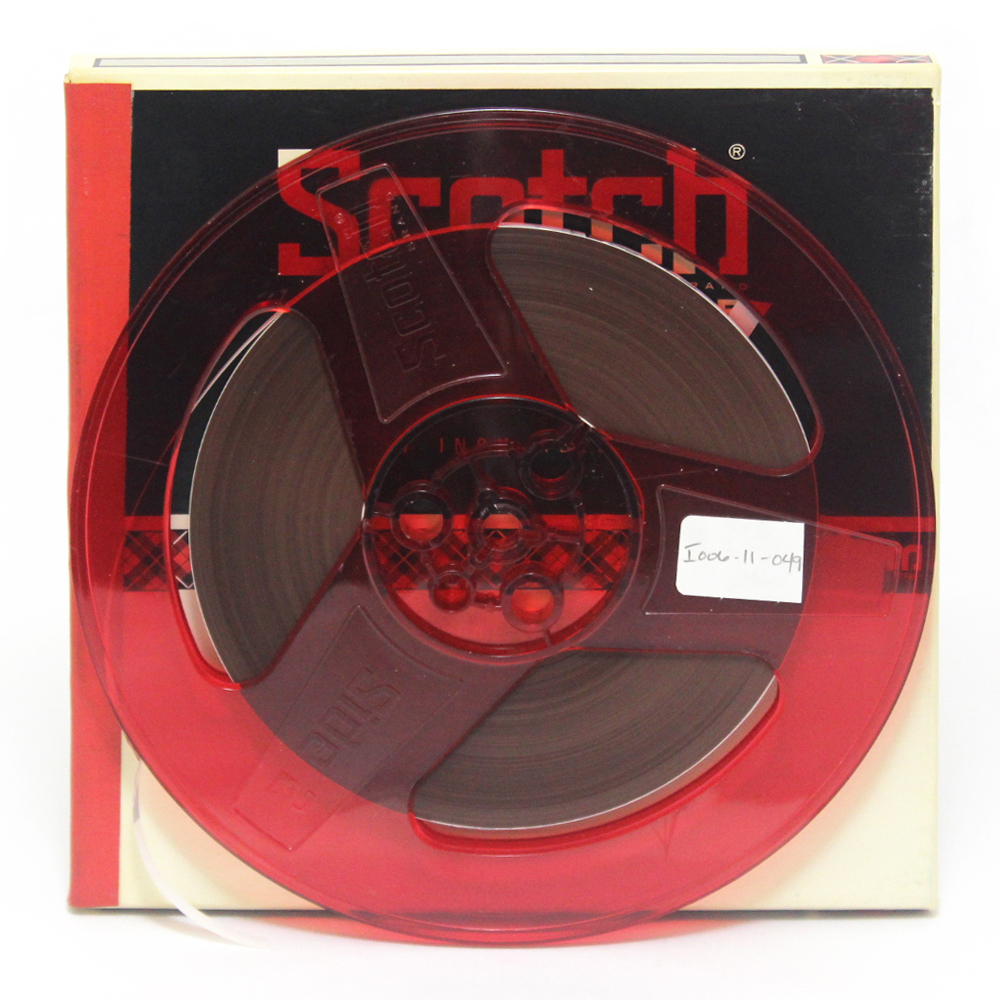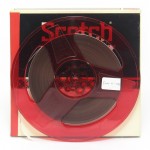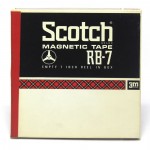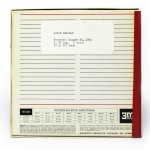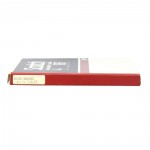Introducer
00:00:00.00
Our poet this evening, Diane Wakoski, by birth and education a Californian, has been a central figure on the New York scene, poetry scene, since 1961 or 62. She first came to attention outside New York City, with the publication of the small, but now somewhat legendary anthology Four Young Lady Poets. Since then, she has published nine volumes of poems, including Coins and Coffins, Discrepancies and Apparitions, The George Washington Poem, Inside the Blood Factory, Greed and The Magellanic Clouds which I believe is to come out this year. I understand that some critics have tended to assign some of her recent work to so-called confessional school, which in her case means very little except that she writes about her own pictures of herself. Contrary to what one associates with the term confessional, Miss. Wakoski writes a poetry that is syntactically direct and undeceiving. Yet, it is at the same time openly adventurous in its vocabulary, full of excitement and risk. It is thus a poetry that may perplex you, not because you do not understand it however, but because you do. And it's certainly one that you will enjoy hearing. Miss. Wakoski, Diane!
Diane Wakoski
00:01:45.71
I wanted to know what that tower was doing, but it's locating the clouds.
Introducer
00:01:56.45
Yeah, I believe there is-- a meteorological interest...
Diane Wakoski
00:02:00.27
Will you fall asleep if we don't have more lights on? I fall asleep in very dark rooms, I'm very loath to let the audience fall asleep, at least just for lights. If you can't hear me, I think there are more seats up here. This first poem I'm going to read is a poem that I wrote to a young poet a few years ago, I guess he's not so young anymore, but he was young when I wrote it, and he came to visit me in New York City to show me his poems, which were very nice poems, but he had been studying with Robert Creeley, whom I very much admire, but who sort of has the kiss of death for any sensitive young man who studies with him, because they all come away looking like Robert Creeley, sounding like Robert Creeley and writing exactly like Robert Creeley. And I'm not exactly known for my tact, so when he asked me about his poems, I said I thought they were very nice Robert Creeley imitations. And he walked away in a huff, and I realized what a message that is constantly being communicated to women in our culture that even though we are asked to be able to think and act intelligently, when it really comes down to the nitty gritty, we are expected to compliment men and not to tell them what we really think. So I wrote him an apology. I'm not really apologizing for what I said, I'm apologizing for being a graceful enough woman in that situation. And this poem, I think, says very much what I would like to say to all of you who wrote poetry who are young, or who do anything else. "An Apology".
Annotation
00:04:20.88
Reads "An Apology".
Diane Wakoski
00:06:15.99
I don't really believe that, as I say. But I do believe in the necessity of having to say it. This next poem I'd like to read is a poem in which, again, I ask a kind of rhetorical question that is a very meaningful one for all women in our culture. I think, by the way, that in spite of the fact that I constantly talk about what problems women do have in a contemporary society that at last has freed them from the burden of constant babysitting and washing and ironing and so forth, that the whole mix up of what roles are about makes the life of a woman very hard, but I think that really, it's probably a man's role, it's harder to play the woman and my experience has been most of the time when women are punished in our society or have real problems with being women it's because they are getting the feed-back from how complicated and impossible the demands on men have been and the men are feeding it back to them and if maybe we could ever solve that real dilemma of what the complete man is allowed to be, then women wouldn't suffer. I don't really think that anything women can do will do any good until the man's world is a more possible one to live in. At any rate, this poems asks a question that I constantly ask, why is it when a woman who shows strength, strength is something that we should all be honoured for having and being able to live with in our life, why should a woman be punished for her strength? As strong women often are. It's called "Slicing Oranges".
Annotation
00:08:19.76
Reads "Slicing Oranges".
Diane Wakoski
00:12:58.10
I'm very interested in, well, actually, something that all poets are involved in, and that is trying to use the mythology of their culture to somehow be able to talk about their own personal realities and still be able to communicate with other people in terms of kind of common cultural experience. And I've been writing a series of poems that I call the "George Washington Poems" to help me do this and everyone in a while I will pick up on other things also and something that's always fascinated me, being from California, are the legends of the Wild West and the way people still sort of look at Americans as pioneers and cowboys and in a way how we like to flatter ourselves, all of us that we have a certain kind of ruggedness because of this pioneer tradition. But one of the confusions that has grown up out of that cultural image is again, something that concerns me very much, as women, we've all been brainwashed to fall in love with men who have this very rugged image who are able to do tough rugged things, and unfortunately, reality doesn't always live up to those images that are presented to us so we're falling madly in love with these men who turn out to often not like women, because that whole western life was geared for men, and not for women. So in this poem I'm lodging my protest officially. It's called "Follow that Stage Coach".
Annotation
00:14:55.22
Reads "Follow that Stage Coach".
Diane Wakoski
00:19:57.31
Do you think you need the mic in the back? What do you think? I'm going to move up? ... Is this an amplifying mic? .... Can you hear me now any better back there? I'm going to read a few "George Washington" poems. Are you getting clicky sound? Maybe if I turn it away, it'll amplify... This poem is called "Patriotic Poem" and I always dedicate it to J. Edgar Hoover when I read. This is in hopes that some day I'll be considered a great American Patriot.
Annotation
00:21:53.31
Reads "Patriotic Poem".
Diane Wakoski
00:25:09.96
The next poem is called "George Washington Writes Home about Harvesting his Hemp". All plantations, I guess, in those days had large hemp crops on them because they had to make their own rope.
Annotation
00:25:35.45
Reads "George Washington Writes Home about Harvesting his Hemp".
Diane Wakoski
00:27:07.90
I understand you had a writer in this series named Gladys Hindmarch, so I'll read you a poem called "George Washington and the Dream of Gladys Hindmarch".
Annotation
00:27:22.35
Reads "George Washington and the Dream of Gladys Hindmarch".
Diane Wakoski
00:31:15.30
This next poem is about an idiosyncrasy that I have, I can't stand men who wear rings on their little fingers. and I wrote this poem, oh, a few years ago when I went to the Guggenheim in New York City to hear a poet that I admire a lot, Gary Snyder, I like that whole, very masculine image he presents, some guy in the woods chopping down trees, working in a lumber mill and things like that. So, it was really a very great shock to see him appear on stage with his lumber boots, his blue jeans, his work shirt, his tweed jacket with a leather patch and a ring on his little finger. So I went home and wrote this poem. It's called "Ringless".
Annotation
00:32:17.59
Reads "Ringless".
Diane Wakoski
00:35:41.57
Another one of my heroes is Beethoven, this is Beethoven's two-hundred centennial by the way. I like Beethoven for a lot of reasons, but I suppose why I pick on him to talk about is that Beethoven stands for the ability to use anger and make it into something very beautiful and powerful. Again, we live in a culture that makes life very difficult for us and one of the things we're taught as children is that to express anger is a bad thing, not that it's a natural, healthy thing and that in fact until the anger is expressed, the love can't exist. So I'm going to read this poem which is called "Ingratitude to Beethoven".
Annotation
00:36:49.91
Reads "Ingratitude to Beethoven".
Annotation
00:41:58.20
CUT
Annotation
00:42:01.51
Continues reading
Annotation
00:43:08.05
CUT
Diane Wakoski
00:43:10.33
...poets in the world I assume. I wrote a poem about landing on the moon. The moon traditionally is poet's subject and I suppose I feel even more involved, since my name is Diane and I've always felt that either the moon belonged to me, or that I was the moon, so having it landed on gave me a lot of complicated feelings. And I wrote this poem called "The Ten Dollar Cab Ride", which is dedicated to Robert Duncan, because he once told this story, some of you must know this, I don't think he wrote it in any of his poems, I once heard him tell the story but it could easily be in one of his poems. It was about a number of years ago when he was much, much younger and his life was much more difficult than it is right now and I guess one of his problems was money and money tends to get people very depressed at times, and he was depressed about everything else and he also didn't have any money so he decided he was going to kill himself, and he didn't really want to do it right that minute. But he wanted to do it, and all he had was ten dollars and so he decided he would take a cab ride and when the ten dollars was up, he'd get out and kill himself. But he made the fatal mistake, or I should say the life-giving mistake, of going for a cab ride in Golden Gate Park in San Francisco which is very, very beautiful and by the end of his ten dollars, he felt so good that he had to get out and walk home. I always thought that was a hopeful story for any of us. Anyway, "The Ten Dollar Cab Ride" for Robert Duncan.
Annotation
00:45:06.05
Reads "The Ten Dollar Cab Ride".
Annotation
00:47:22.12
CUT
Annotation
00:47:43.58
Poem is resumed "...silkily down...resting surrounded by leaves...."
Diane Wakoski
00:50:15.29
I'm going to read one last poem which is the title poem of a book, it's called the "Magellanic Clouds". And those of you who took Astronomy 1 and have your own telescopes and have ever been to the southern latitudes, you know that the Magellanic Clouds are probably another galaxy, and they appear as a cloudy spot in the sky on a clear night in the southern hemisphere, and they were named by Magellan, for himself, of course, when he first saw them.
Annotation
00:51:00.53
Reads "The Magellanic Clouds".
Annotation
00:56:00.27
END OF RECORDING.
